Amid violence and boycott, Bangladesh goes to polls knowing there can be only one outcome
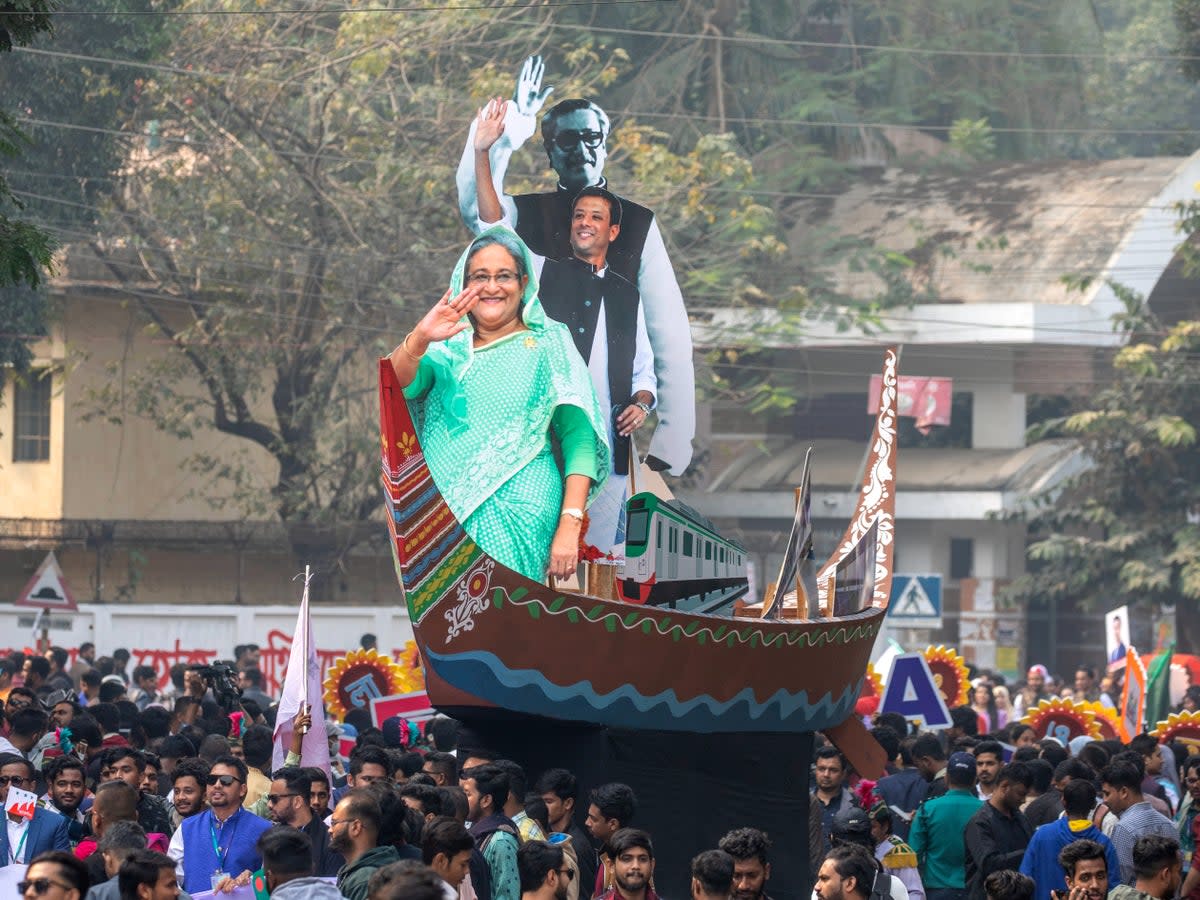
Bangladesh is set to hold its 12th general election this Sunday – but the result is already known. Sheikh Hasina – perhaps the most powerful woman in South Asia – is certain to be re-elected as prime minister of Bangladesh for a fifth term in what critics have called a “dummy election”.
The main opposition Bangladesh Nationalist Party (BNP), led by jailed former prime minister Khaleda Zia, is boycotting Sunday’s polls, arguing that it would be a futile and unfair exercise under the Hasina administration.
Bangladesh is the first of many countries to hold elections in 2024 at a time when democratic standards are sliding across the world. This year will see some 2 billion people eligible to vote in elections – a record for humanity.
But Hasina, the 76-year-old leader of the Awami League party who once fought for Bangladesh’s right to become an independent democracy, is now being accused of leading the country towards autocracy by suffocating dissent through arbitrary detentions.
The domestic political crisis and a crackdown on the opposition has triggered strong condemnation from the US, which announced visa restrictions against the country’s officials for “undermining the democratic election process”.
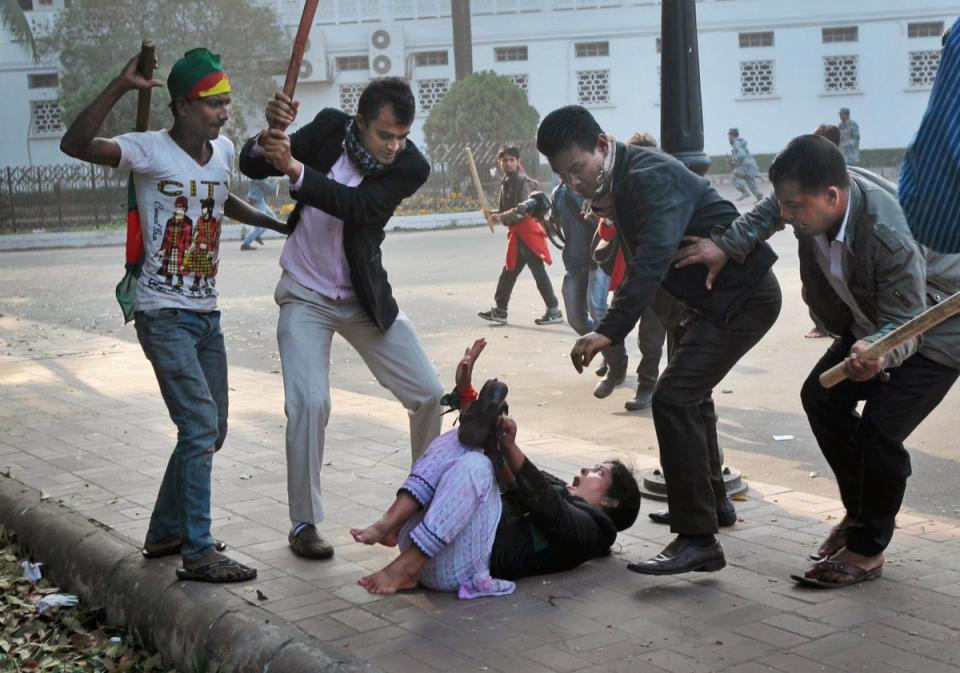
Bangladesh witnessed a year of political violence in 2023 with protests calling for Hasina to step down forcefully quashed by the police, and cases brought against the BNP’s leadership. More than 24,800 members of the BNP have been arrested, a party leader told The Independent, citing jail records.
Nobel peace laureate Muhammad Yunus became the latest person to be jailed over labour law violations last week.
That violence has run into 2024 with at least four people killed on Friday in an apparent arson attack on a train. It was “an act of sabotage” before the elections, the authorities said.
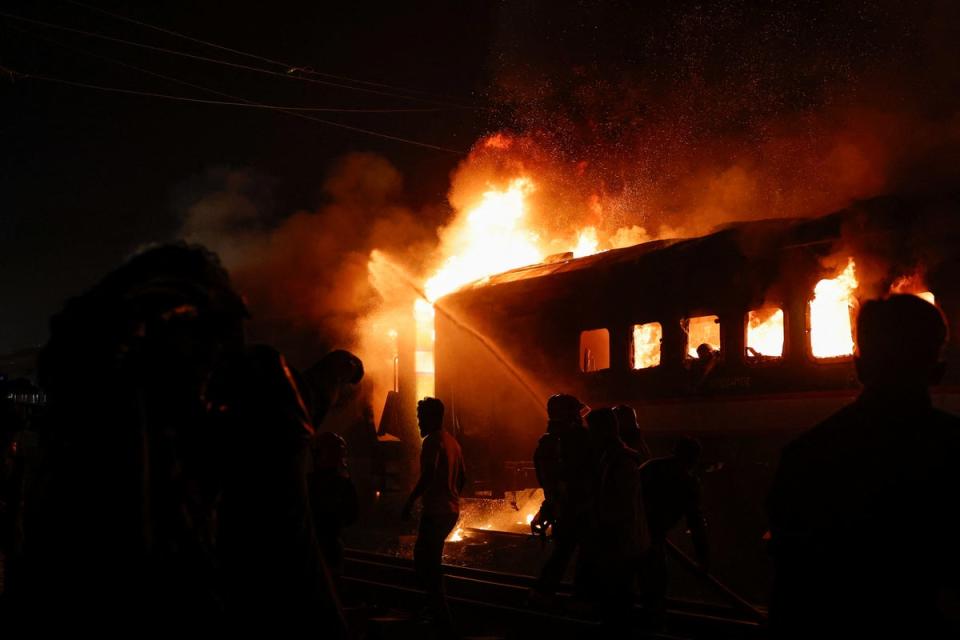
The opposition had called for Hasina to step down and urged her to let a neutral caretaker government administer the election, saying this was the only way it could be conducted fairly. Hasina’s government rejected the idea, saying there was no provision in the constitution for such a move.
“Regardless of what transpires on 7 January, this Awami League government remains illegal and illegitimate,” acting BNP chair Tarique Rahman wrote on X, formerly Twitter.
Regardless of what transpires on 7 January, this Awami League government remains illegal and illegitimate.
As the main opposition unifying the nation, BNP is dedicated to restoring the power that was and continues to be unjustly taken away, but rightfully belongs to the people… pic.twitter.com/ya96h5CTAD— Tarique Rahman (@trahmanbnp) January 6, 2024
The BNP also boycotted the 2014 election but participated in 2018 – a decision which party leaders have since described as a mistake amid widespread allegations of rigging as well as voter and candidate intimidation.
On the eve of the election, rickshaw pullers took to the streets of Dhaka, urging members of the public to stay away from the polls. “Boycott this election. We don’t believe in this one-party rule,” they chanted as they traversed their way through the crowded streets of a capital adorned with billboards of Hasina’s image.
Elsewhere, posters welcomed journalists and voters to the election celebrating the “world’s fifth-largest democracy” in a Muslim-majority country of nearly 170 million people.
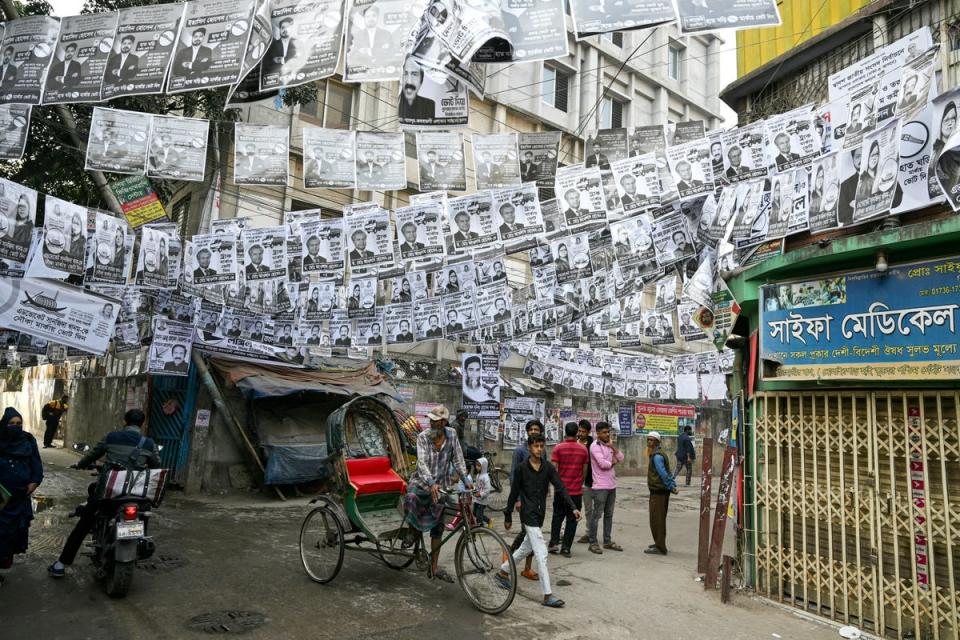
However, this unusual January election has left ordinary citizens bereft of choice, perplexed and angry.
“Growing up I was always excited to cast my first vote. It is important to exercise our democratic right, but now we are left with no choice but to boycott the election,” Mirza Alam, a 19-year-old student, told The Independent.
Alam is among the estimated 15.4 million people eligible to cast their ballot for the first time on Sunday. “Our participation won’t alter the result,” he said.
The ruling party has said it is still expecting at least 60 per cent of the country’s 119.6 million eligible voters to turn up on Sunday, despite the boycott calls.
Shahjahan Ali, a clothes shop owner in Dhaka and Awami League supporter, believes Hasina’s government has been a crucial force in turning Bangladesh’s economy around over the past four years.
The country was touted to be the fastest-growing economy in Asia, surpassing giants such as India. Bangladesh “will never look back again”, Hasina said last year as she cast herself as the leader of an aspiring upper-middle-income country.
“It will continue marching to be a smart, developed and prosperous country,” she announced.
Ali argues that economic development has been inclusive, with both the rich and the poor equally benefitting from the government’s policies.
“We have seen the growth,” he said. “There are more opportunities for the new generation here. My children won’t have to migrate to a different country for better job prospects.”
Hasina has used the country’s massive garments sector – the world’s biggest exporter after China – as the bedrock for broader economic growth. She is credited with increased enrolment of girls in school, development projects and domestic stability in the country following a turbulent past.
But high inflation and diminishing foreign reserves forced Hasina to seek a $4.7bn (£3.7bn) IMF bailout last year amid fears that the country could be plunged into a dire economic situation similar to regional neighbour Sri Lanka.
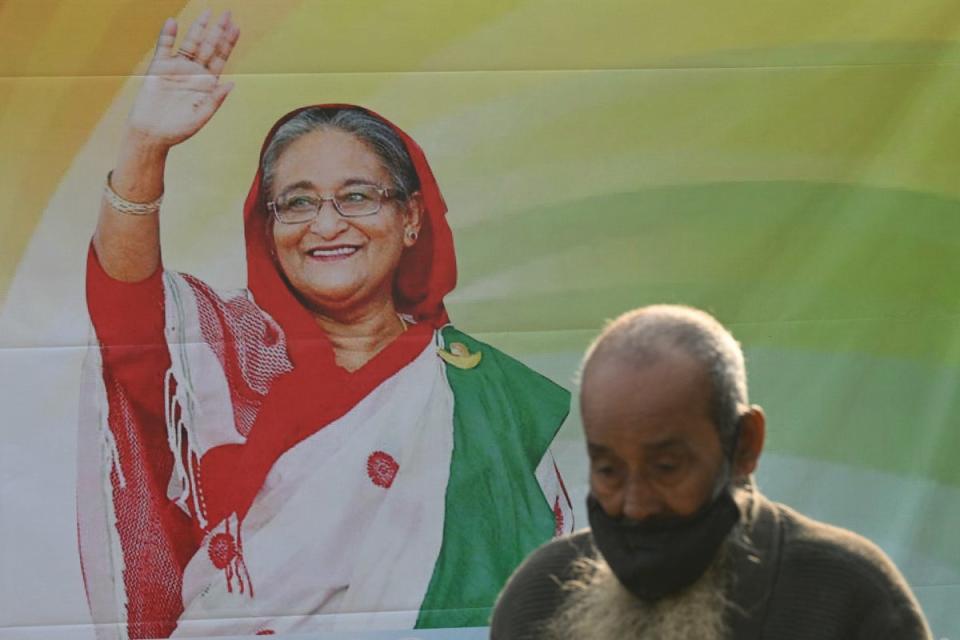
The rise in the cost of living led garment sector workers to stage demonstrations over low wages, which quickly turned violent and resulted in the police killing at least three protesters.
Campaigning for the elections officially came to an end on Friday morning. The Election Commission announced polling would be held in 299 constituencies out of 300 across the country after an independent candidate died of natural causes.
Hasina critics have accused the Awami League of planting some of their partymen as independent candidates in a show of false participation and fairness.
The opposition says it is not giving up on ousting Hasina from power, and is prepared for a long fight that goes beyond this vote.
“In the past five/six months at least 11 members of our party have been tortured to death in prison,” AKM Wahiduzzaman, the BNP’s shadow information and technology affairs secretary, told The Independent. “This is not a fair election. This is not even an election. They are not even letting the opposition take out political rallies and continue to intimidate using the police and judiciary.
“Sheikh Hasina has created a totalitarian government in Bangladesh. Had BNP contested the polls, it would be legitimising her attack on democracy. About 2,000 of our party leaders have been sentenced to an average of two years in prison.”
The claims were denied by the ruling Awami League, which maintained that BNP members were arrested for arson and violence.
“The figures cited by the opposition are incorrect. The opposition for their agenda was putting the country’s security at stake. We couldn’t have allowed that,” a spokesperson for the government said.
Wahiduzzaman criticised Bangladesh’s three powerful allies – India, Russia and China – for supporting Hasina in a bid to increase their own influence in the country.
India, which surrounds Bangladesh on three sides, has been the country’s most important ally since it broke away from Pakistan in 1971. The countries share a 271km-long border.
Hasina has routinely expressed her gratitude towards New Delhi for extending military support to her father, Sheikh Mujibur Rahman, during the 1971 liberation war. “India has always been our friend. We are grateful to India for it has always helped in time of need,” she said in March 2023.
Hasina has successfully positioned Bangladesh as an ally to both India and China – two Asian giants fighting to exert more influence across the subcontinent.
India and China have in return generously bankrolled a slew of infrastructure projects in Bangladesh, with New Delhi offering more than $7bn in credit lines over the past decade.
While India’s foreign ministry has denied involvement in Dhaka’s domestic affairs, experts suggest there is concern in New Delhi that any kind of public pressure aimed at Hasina could push her administration towards Beijing. The US, one of the largest clothing importers in the world, raised alarm in September over human rights violations. Hasina responded by accusing Washington of trying to oust her from power.
Hasina has also managed to successfully strengthen Bangladesh’s ties with Russia despite Vladimir Putin’s invasion of Ukraine, which has otherwise largely isolated Moscow on the world stage.
“Say what you will about Hasina, but she has managed the great power competition very effectively,” Michael Kugelman, director of the Wilson Center’s South Asia Institute, told the Associated Press.
The UN secretary-general’s associate spokesperson, Florencia Soto Nino, said in New York on Wednesday: “We’re watching the process closely, and we hope that all elections happen in a transparent and organised manner.”
Hasina addressed the nation in a final televised campaign speech on Thursday night, urging people to head to ballot stations.
“If I have made any mistakes along the way, I ask your forgiveness. If I can form the government again, I will get a chance to correct the mistakes,” she said.
“Give me an opportunity to serve you.”

 Yahoo News
Yahoo News 
